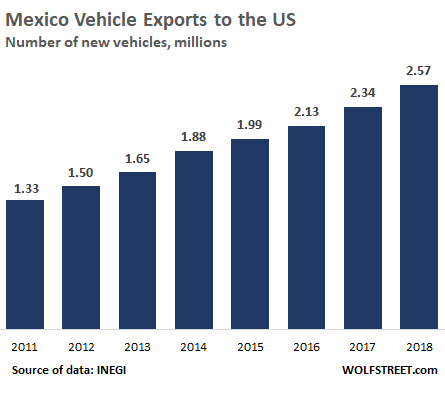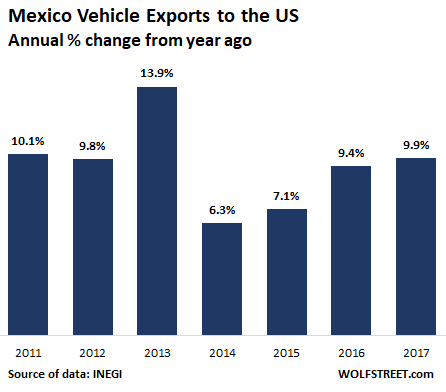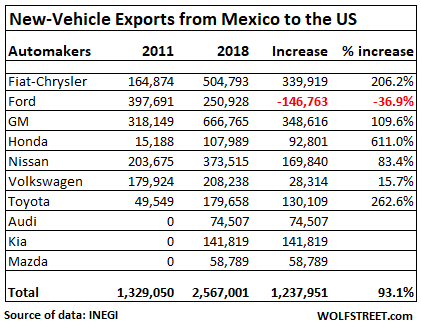GM’s Mexico vehicles now are 23% of its US sales. And the Japanese have massively discovered Mexico’s cheap labor.
By Don Quijones, Spain, UK, & Mexico, editor at WOLF STREET.
The total number of new vehicles exported from Mexico to the US in January rose 9.1% from a year ago to 191,072 vehicles, according to figures compiled by the vehicle manufacturers association AIMA and released by Mexico’s National Institute of Statistics and Geography (INEGI). In the year 2018, total new vehicle exports from Mexico to the US leaped by 9.9% to 2.57 million vehicles, after having already jumped by 9.4% in 2017.

Since 2011, vehicle exports to the US have surged by 93%. During that period the number of vehicles exported to the U.S. from Mexico has gone up every single year, sometimes by double-figure percentages, including 13.9% in 2014.
During the worst year of this period, 2015, the total number of vehicles sent from Mexico to the U.S. still grew by a 6.3%. Since then, the annual percentage rises have gradually recovered, hitting 7.1% in 2016, 9.4% in 2017 and 9.9% in 2018:

There are two mains reasons why Mexican vehicle exports to the U.S. have almost doubled in the last eight years, from 1.36 million units a year to 2.57 million:
More global car manufacturers have set up shop in Mexico. In 2005, when INEGI began publishing stats on Mexico’s vehicle exports, there were just six large vehicle manufacturers (Chrysler, Ford, General Motors, Honda, Nissan and Volkswagen) producing and exporting cars from Mexico. By 2011 that number had risen to eight, after Fiat and Toyota had joined the fold. Today, the total number is 11, following the recent arrival of Audi, Kia and Mazda.
Some of the biggest manufacturers have significantly expanded their operations in Mexico, where salaries for autoworkers are just a fraction of what they are in the U.S. In 2011 General Motors exported 318,149 vehicles from Mexico to the U.S. By 2018, that had surged by 110% to 666,765, accounting for 23% of GM’s total US sales in 2018.
Fiat-Chrysler has also massively expanded its Mexico operations over the last eight years, increasing its total annual exports to the US by over 200%, to 504,793 units in 2018. Other big movers include Honda and Toyota. Audi, Kia, and Mazda now assemble cars in Mexico but didn’t do so in 2011. Note that Ford is the only automaker whose exports from Mexico to the US actually dropped (-37%) since 2011. Most of what Ford builds in Mexico are cars, and Ford’s car sales in the US have plunged:

Here are some additional observations:
- Audi exported 74,507 SUVs from Mexico to the U.S. in 2018. But over the second half, the monthly totals have waned after hitting an annual peak of 11,214 in August.
- Fiat exported a meager 4,155 units in 2018. The monthly totals have also been on the decline of late, hitting an annual low of just 58 units in January.
- Ford’s exports from Mexico to the US, which have been shrinking for years, accounted for 10% of its US sales, compared to GM, whose Mexico units accounted for 23% of sales in the US.
- Kia exported 141,819 vehicles from Mexico to the U.S. in 2018, though the last few months saw a gradual slowdown in the outflow.
- Nissan’s total production in Mexico for sales around the globe — not pictured in the table — slipped 10% in 2018 to 763,257.
- Toyota makes many of its Tacoma pickups in Mexico for export to the US.
- Japanese automakers in total exported nearly 720,000 vehicles to the U.S. from Mexico in 2018, up 168% from 2011.
For Mexico’s auto industry as a whole, overall exports to the U.S have been slowing (-13%) between December and January, from 218,865 vehicles to 191,072, following a month of virtually zero growth between November and December. Between December and January the total number of light vehicles Mexico exported all over the world also shrank, from 275,000 units to 242,000.
The current global slowdown in auto demand is likely to have an effect given that roughly one out of every five cars Mexico exports are shipped to countries other than the US, including Canada, Europe, China and other parts of Latin America.
The recent reduction in production could also be due to local disruptions: In January — the worst month for vehicle exports — a number of key car-producing States in Central Mexico, such as Puebla and Queretero, suffered the brunt of of the disruption caused by gasoline and diesel shortages resulting from the Mexican government’s war against rampant oil theft. There was also disruption caused by striking maquiladora workers, including in car parts plants, over low pay in the northern state of Tamaulipas and the central Pacific state of Michoacan. Whether these two factors were enough to hamper the flow of finished cars to the U.S. is as yet unclear. By Don Quijones.
These workers are a lifeline for Mexico. Read… Mexico’s Cash Cow: Remittances from the US & Other Countries Surge to New Record
Enjoy reading WOLF STREET and want to support it? You can donate. I appreciate it immensely. Click on the mug to find out how:
![]()


Wow! Maybe Mexico should pay for the Wall! In 5 or 10 years they are going to need it to keep U.S. workers out of Mexico!
Your statement could prove prescient in 10 yrs.. Rome wasn’t built or felled in a day.
Maybe that has been the intent all along. With the future US economy tanking in the near future, the intent of the wall is to KEEP the US DEBT SLAVES from running away!
Mexico – making automobiles Americans want to drive!
I remember when Americans tourists in Europe lived like kings, now the Chinese are the free spenders and Americans are the tightwads. Americans looking for work abroad, overstaying visas, and migrating for a better life may be unlikely now, but in a few years time……
Americans have started hiding in remote places to escape student debt. This guy hid in a remote jungle in northeastern India.
Idaho Potato: Been going on for a couple years. People can’t pay the student debt and left the country.
TheChinese big spenders are those who make huge profits from being able to sell the labor of the Chinese working class at a fraction of what it would be worth if the exchange rate were even close to its purchasing power parity level. The reason it is not is that the Chinese government has in effect pledged to pay about four times that level (used to be eight times) for every dollar an exporter brings in. Although this means that in real economic terms the much ballyhooed Chinese dollar reserves represent a huge loss to the nation and a whole — they paid about 30 trillion yuan for dollars really worth only about 4 to 8 trillion — the loss has been spread out so hardly anyone can see it. But it’s there nonetheless, in living standards lower risen less than they should have. And the 20 trillion excess is exactly what the kleptocracy tourists are spending.
Wow, I can better understand why the Ram Pickup and Chevy Silverado are so profitable since they are built in Mexico using $3 to $4 an hour labor (or less). Amazing Ford can stay in business building the F150 in the US.
In my view, if Mexican auto workers were paid a wage of $16/hr. or more, there would be far less imports to the US ? Maybe the wall wouldn’t be needed too ?
But American only government contracts don’t hurt to have with every major State and Fed agency.
My new Mustang was built at the Flat Rock plant in Michigan. It has a UAW sticker on it. Kinda proud of that.
We covered wage repression in Mexico. It’s a huge issue:
https://wolfstreet.com/2017/09/29/repression-of-wages-in-auto-manufacturing-in-mexico/
Thanks Wolf, went and re-read this. Huge may be an understatement. To me, your article explains the failure of NAFTA quite clearly
The discussion that followed was also very good, I just reread it all also. Where you state in comments:
“Did you read the part in the article that describes how these wages are being kept low – by conniving local politicians and union bosses and global automakers? This is corruption in the labor market, at the expense of the workers, who are consumers, and thereby at the expense of the overall Mexican economy, and by extension at the expense of the US workforce and economy. I thought that was pretty clear in the article.”
about the “protection” contracts, I think this is to move union action out of the way, as low wages are legal and demand of the low wage work plentiful. That makes it maybe corrupt only regarding union representation, whatever a person’s view of unions is. It also underlines the tendency for business to be conducted in a top down manner, which often entails much corruption.
However I think Binky’s comment is closest to representing what is occuring regarding NAFTA , which is a disruption of the previous local economy, with globalist finance and trade using its arbitrage to undercut the pre-existing market. In theory that is progress arriving, often in practice the opposite occurs for locals.
People easily forget that in the first world west a lot of the quantity of wealth enjoyed is product of this arbitrage, it is partly how we justify being more service economies. Quantity is not quality nescessarily though, so the unease and seeming hypocrisy and national imbalances that exist on both sides with regard to the arrangements all point to something more structural and well beyond simple market interpretation. That something probably hinges on sets of values that are not recognised in simple mathematical calculation or in those normal market interpretations, and could include societal or cultural realities that do not react positively to certain changes in format – not out of planned ideological resistance but just due to the resulting wider reality that is engendered.
Unless people properly understand how other societies work, then it is very easy to just stereotype and be done. Even if that were somehow nescessary, it still does not enlighten us as to the real world position we are actually taking in that equation, and that might be our own loss, including in terms of wealth.
The world is a mysterious place, people have always tried to impose their order to it, at best they are usually only part successful.
According to the Center for Automotive Research, as of 2018, the average wage for Mexican auto assembly plants is $8/hr, and the wage in parts plants if $4/hr. Bleak, but not quite as bleak as the plants covered by the Free Press.
Oops, that was the WSJ, not the Detroit Free Press.
Prior to Dieselgate, I was a VW fan. It started in Oregon when I was apparently taken home from the hospital in a hippie bus.
-My first car was a Mexican made Jetta….lesson learned “don’t buy a German car in the first year of production.”
-My second car was a German produced Golf. Which I drove as an exchange student all over Scandinavia, amazing vehicle.
-Then a number of Mexican assembled diesel Jettas. Polish assembled engine, Argentinian transmission. Missed the ciler pack fiasco recall, and the DSG cluster. Lesson learned: “it’s got to be German, Diesel, and Manual”
-I moved to Australia, and lastly, a South African assembled Golf, diesel manual. Drove it all over OZ, loved it. Was literally “rolling coal” out the tail pipe when I sold it.
VW attempted too hard to be the number one car company in the world. And seriously burnt their customer.
You were lied to. You were had. VW was a criminal organization. Dont look back fondly.
Just a drove a few hundred KM in a Swedish assembled Volvo sedan here in North Africa. smooth ride. Three cheers for globalization.
With economic prospects improving, Chinese and German (Mercedes) are finalizing plans for localized assembly plants. Hey, they’re lower cost than the chinese workers!
Regarding Mexico, my BlackBerry (which I still use daily) was assembled in mexico- a solid device. Ofcourse, no more, ‘new’ blackberries are now all made in China.
Pity Trump didn’t fix NAFTA. The Wage differentials btwn MEX are far too great for the Current and Future(?) Agreement.
Based on Wages, MEX should be grouped together as a Trading Block with the Rest of the Americas South of the USA_Border; and Tariffed prudently.
IMHO, the USA and Other Major Market Economies should be able to sustain Their Own Auto Industries Domestically. I.E., AutoMakers should Build what They Sell in the USA – in the USA or Their Country of Origin.
=>And the Japanese have massively discovered Mexico’s cheap labor.
Better yet, it can exploit American labour at the same time.
Exploitation on both ends. What could be better?
Cheap-labor corporatists – is there nothing they can’t do?
“Used to have a town, but the factory moved away
Down to Mexico, where they work for hardly any pay
Used to have a country but they sold it down the river
Like a repossessed farm auctioned off to the highest bidder”
– Bruce Cockburn, prescient in 1991
One should really look at the wage time and cost in relation to the cost of the manufacture of a vehicle.
Surely with robots and automation, the wage time and therefore cost is falling per vehicle.for their EV and notice a lack of human beings.
I was watching this video of the production of the Audi electric motor
https://www.youtube.com/watch?v=zttC2x9nMEw
Despite this, the factory is in Hungry, not Germany so another consideration must be the cost of the land for the factory, construction of the factory, more lax health and safety issues and probably the biggest being tax incentives.
Was Donald Trumps reworking of the trade laws with Mexico just for show?